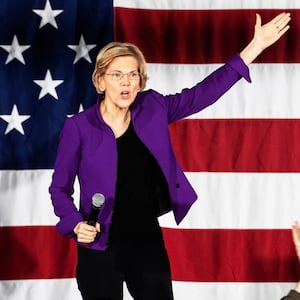The money chase is on, and Democrats across the presidential field are bragging about their low-dollar average contribution size, while downplaying their contacts with big donors in Hollywood and on Wall Street.
Elizabeth Warren took that tactic a step further and declared she would not attend high-dollar fundraisers, or accept bundled checks from big donors. Bundling occurs when well-connected donors gather checks of up to $2800 from their circle of associates, the maximum an individual can give a candidate in the primary.
After struggling to raise large-dollar contributions, Warren decided to set herself apart in the crowded field by eschewing them altogether after a heated internal debate within her campaign.
ADVERTISEMENT
Freeing herself from attending fundraisers gives her more time with voters, and according to her campaign, from January through March, Warren did 48 events in 12 states and posed for more than 12,000 selfies with voters.
“It may have been a case of trying to make steak out of hamburger,” David Axelrod, Obama’s former campaign manager, observed in an email. “She apparently wasn’t raising enough online or off, so this was a way of making a virtue of a shortcoming.”
That’s all well and good if Warren can compensate with a robust online fundraising presence that she has not yet demonstrated. In one ominous sign, her finance director departed the campaign at the end of last month.
Candidates have until April 15th to release numbers from the first quarter, which will offer more insight into the wisdom of her move to reject big donors before they could reject her.
“If you’re running on the message that powerful interests exert too much influence, her move made sense,” Axelrod wrote in his email, noting however that Warren did raise money for her Senate campaigns the conventional way. She also was able to transfer $10 million from her Senate fund to her presidential race to help make up for any shortfall.
To voters skeptical she can defeat President Trump, Warren touts her 12-point statewide win over Republican Scott Brown in Massachusetts in 2012. And she left open the door to revisiting her purist pledge about raising money should she win the Democratic nomination.
The Bernie Sanders campaign on Tuesday announced that he had raised $18.2 million in the first quarter of 2019, making him the frontrunner in the money sweepstakes, thanks to the lists of supporters he gathered in 2016. Kamala Harris is next in the pecking order with $12 million followed by Beto O’Rourke with $9.4 million and Mayor Pete Buttigieg, the man whose name no one could pronounce just a few weeks ago but who raised a remarkable $7 million. Warren has yet to announce her total.
Julianna Smoot, who was Barack Obama’s finance director in 2007, put that in perspective and reminded the Daily Beast that Obama raised $25.7 million in the first quarter of 2007, effectively matching frontrunner Hillary Clinton’s $25.8 million haul, and cementing his status as a serious contender.
“Building the base of volunteer fundraisers, or bundlers, is how we did it for President Obama,” says Smoot. “I’m all for bundlers, they know the community and they have enough knowledge to make the pitch. Not taking money from people who can give the higher amount is weird.”
Because of the larger-than-normal field this cycle, many of the party’s biggest donors are sidelining themselves, waiting to see how things shake out.
“Larger donors are not, in and of themselves, evil or self-interested,” Axelrod said in response to a question about how they’ve been demonized.
“Many I’ve met care deeply about the country and simply want to do what they can to advance a better future. But we live in times in which the insatiable need for money also drives policymakers into the arms of less benign interests and forces candidates to spend inordinate amounts of time with donors instead of voters and constituents.”
Candidate Obama in 2008 made a decision that was at odds with his reformist message when he declined to take public financing for his general election campaign. Obama had proven his ability to raise money, but by going outside the system, “we knew we would be adding to the proliferation of money in the race, which did not fit comfortably with the reformist sensibilities of our campaign,” said Axelrod.
“We did it because we anticipated massive third-party spending on the other side that we would have to match from our campaign. We knew that we had tremendous upside potential to raise money, including a robust small dollar campaign online, and made the decision to capture it and ensure we would not be in the vulnerable position John Kerry found himself in 2004.”
That turned out to be a good bet by Obama. Whether Warren’s decision will pay off is not yet known.
One thing is certain, though: the voracious need for money to fund a campaign. It was Dick Gephardt, former Democratic minority leader, who famously said after he came in fourth in Iowa in 2004, “Presidential campaigns don’t end, they just run out of money.”
Another cautionary tale is that of John Glenn, former astronaut and senator from Ohio, who didn’t pull the plug on his 1984 presidential campaign soon enough. It took him more than 20 years to finally close the books on more than $2 million in bank loans that he had taken out to keep his campaign afloat.
Raising money is hard enough, raising money after you’ve lost is a whole other challenge.






